The ABA is hosting the Children’s Institute in Portland this year and I’m thrilled to be hosting a group of children’s booksellers at Annie Blooms bookstore in Multnomah Village.
Tag Archives: middle grade fiction
Summer Reading Treasure Hunt at Rediscovered Books in Boise
I’ll be doing a summer reading kick off and treasure hunt at Rediscovered Books at noon on Sunday. Bring your phone and your walking shoes and we’ll talk a little bit about The Turn of the Tide and then have a GPS guided treasure hunt throughout the neighborhood.
Middle Grade Monday book review: The Great Trouble by Deborah Hopkinson
I’m going to try to read all the books that are on the 2015-16 OBOB list with me and I’m so happy to start with a wonderful book by my friend and fellow Portlander, Deborah Hopkinson. This is a story after my heart because epidemiology was my 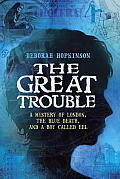 mother’s field. It’s an account of how the enterprising Dr. Snow and a couple of street urchins proved that a cholera epidemic that a broke out in Victorian London was caused not by the heavily polluted air but by the contaminated water in the Broad Street pump.
mother’s field. It’s an account of how the enterprising Dr. Snow and a couple of street urchins proved that a cholera epidemic that a broke out in Victorian London was caused not by the heavily polluted air but by the contaminated water in the Broad Street pump.
Three things for a kid reader to love:
1. Any kid who lives Bones or CSI or other tv crime scene procedurals will love this. It’s full of real nitty gritty details of how to prove that disease is water-borne when the water tastes fine and the air stinks. Great fun, and not “teach-y”
2. Cool historical maps of the epidemic are in the back matter. Love Maps!
3. The narrator, a kid who goes by the name Eel, is appealing and keeps the events on a very human scale. In finding and answer to the riddle of the Broad Street pump, Eel finds a home and protection and education for his beloved little brother.
Something for the writer to think about:
Any story about an epidemic is going to be tragic and this one doesn’t shrink from death. However, and this is the important distinction to me, it doesn’t revel in death or glamorize suffering. It’s a fine line to walk and I think it’s handled beautifully. Well worth a read just to see how Deborah gets the balance just right.
Also I’m going to tag this as a diverse book in terms of class. It addresses very directly the injustices Eel faces because of his economic status. It’s easy to over-look or romanticize the poor. Here’s a book that in my opinion does them justice. The low-income characters are a mix of good and bad actors and the upper-income characters are an equally mixed bag in terms of personal virtue. Bravo!
Middle Grade Monday book review: ECHO by Pam Muñoz Ryan
Ordinarily I just take the jpeg of a book cover from the internet, but for this one I just had to take a picture of the book with my Hohner vest pocket harmonica. It’s smaller than the instruments referred to in the story, and I haven’t played it in ages, but it reminded me how much I loved having music in my pocket as a child. Echo is hard story to sum up briefly but it’s got the best flap copy I’ve read in a while so here’s that.
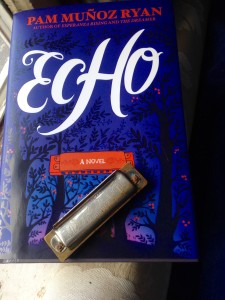 Lost and alone in a forbidden forest, Otto meets three mysterious sisters and suddenly finds himself entwined in a puzzling quest involving a prophecy, a promise, and a harmonica. Decades later, Friedrich in Germany, Mike in Pennsylvania, and Ivy in California each, in turn, become interwoven when the very same harmonica lands in their lives. All the children face daunting challenges: rescuing a father, protecting a brother, holding a family together. And ultimately, pulled by the invisible thread of destiny, their suspenseful solo stories converge in an orchestral crescendo.
Lost and alone in a forbidden forest, Otto meets three mysterious sisters and suddenly finds himself entwined in a puzzling quest involving a prophecy, a promise, and a harmonica. Decades later, Friedrich in Germany, Mike in Pennsylvania, and Ivy in California each, in turn, become interwoven when the very same harmonica lands in their lives. All the children face daunting challenges: rescuing a father, protecting a brother, holding a family together. And ultimately, pulled by the invisible thread of destiny, their suspenseful solo stories converge in an orchestral crescendo.
Richly imagined and masterfully crafted, ECHO pushes the boundaries of genre and form, and shows us what is possible in how we tell stories. The result is an impassioned, uplifting, and virtuosic tour de force that will resound in your heart long after the last note has been struck
3 things for a young reader to love
1. This is a really intriguing mix of realistic historical and fantastical elements. There’s lots to learn about the history of the 20th century here but wrapped as it is in a mythic prophesy, it doesn’t feel “teachy” yet it brings to light some really interesting and dark and difficult aspects of American and German history.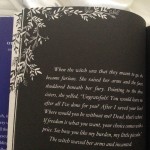
2.There is some truly beautiful book craftsmanship here: decorated pages, a lovely cover under the dust jacket, and three songs with harmonica notation in case you want to learn the music from each section of the book.
3. It’s long! I know some people are going to look at that as a disadvantage in the supposedly attention deficit MG market, but I disagree. MG readers have time to read. Some of them love long books, love the seriousness they imply, love getting wrapped up in a tale that carries them along for hours and hours. And yet there’s nothing here 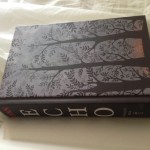 to edge it up to YA. This is the perfect book for that tender-hearted teenaged reader who is not interested in sexual relationships and blatant violence. It’s also great for that really young high level reader who needs a challenge and a story with substance but isn’t up for YA content.
to edge it up to YA. This is the perfect book for that tender-hearted teenaged reader who is not interested in sexual relationships and blatant violence. It’s also great for that really young high level reader who needs a challenge and a story with substance but isn’t up for YA content.
4. Okay I cheated 4 things. It’s diverse, seamlessly interweaving Jewish, Irish, Japanese and Hispanic experiences.
Something for the writer to think about
Prologues and epilogues are routinely discouraged by writing instructors and there are good reasons to be cautious about including one. But here’s an example of one that has been done beautifully. It’s a bold choice to mix the fantastical elements of the prologue and epilog with straight up historical fiction in the other three sections. I think it works brilliantly here making it a true bridge to the more complex and layered stories they will read as adults. And the book has something lovely to say about the nearly magical power of music to give the musician comfort and courage. I’m not a big believer in predictions, but here is a book that’s going to be on lots of best book of the year lists.
What I did this summer
Today is my kid’s first day of school and I thought I’d celebrate by tackling my least favorite essay topic from school. I hated it simply because if something exciting happened it felt like bragging to write about it, and if nothing much happened, well, it’s a little depressing to call that to mind at the beginning of a school year.
The truth is I’ve had, by most standards, a very ordinary summer. We took a little trip to the mountains and a day trip to the beach. We did yard work. We made jam. But four things have stood out for me as making a difference in my writing. So I thought I’d say a little bit about all four.
1. A change of setting tends to lead to new work or at least new ideas.
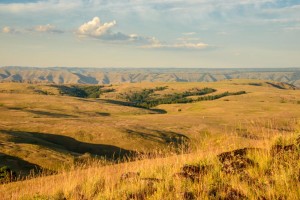 It was my great pleasure to participate in the Outpost Workshop of the Fishtrap Summer Gathering. I spent a week tenting out on the Zumwalt Prairie in northeastern Oregon. It was an astonishing landscape–outwardly empty, yet on closer inspection teeming with wildlife from bull elk to least weasel to all manner of song birds. The days got into the 100s with barely a scrap of shade and the nights dipped down into the 30s. The altitude was a challenging 5000 feet or so. Not the most conducive environment to productive writing, and yet I found myself flooded with story ideas, thinking for example, of what it would be like to homestead such a place with it’s punishing climate but rich resources.
It was my great pleasure to participate in the Outpost Workshop of the Fishtrap Summer Gathering. I spent a week tenting out on the Zumwalt Prairie in northeastern Oregon. It was an astonishing landscape–outwardly empty, yet on closer inspection teeming with wildlife from bull elk to least weasel to all manner of song birds. The days got into the 100s with barely a scrap of shade and the nights dipped down into the 30s. The altitude was a challenging 5000 feet or so. Not the most conducive environment to productive writing, and yet I found myself flooded with story ideas, thinking for example, of what it would be like to homestead such a place with it’s punishing climate but rich resources.
2. New company tends to lead to new perspectives
I met a woman named Janet at the Outpost workshop who has worked on the Zumwalt and in the near by Wallowa Mountains and Snake River canyons for most of her life. She knew an incredible amount about the natural and human history of the area. She shared some of the history of the Joseph band of the Nez Perce who lived near Wallowa Lake up until the famous surrender of Chief Joseph in 1877. You probably remember ‘From where the sun now stands I will fight no more forever.’ Its one of the most quoted bits of Native American writing ever. Janet gave the fuller version of his surrender and cast the story of Chief Joseph into an entirely different and far more interesting light. Whether the things I’ve learned become a story I write or not, it’s good to periodically revisit what I’ve learned as historical truth, and consider what that truth might look like from a different perspective.
You probably remember ‘From where the sun now stands I will fight no more forever.’ Its one of the most quoted bits of Native American writing ever. Janet gave the fuller version of his surrender and cast the story of Chief Joseph into an entirely different and far more interesting light. Whether the things I’ve learned become a story I write or not, it’s good to periodically revisit what I’ve learned as historical truth, and consider what that truth might look like from a different perspective.
3. World news is less distant than it seems

Along with the tragic events in Ferguson, Missouri and the ebola outbreak in Africa, one of the world events that has dominated the news this summer is the solo migration of children from Central America. It would be easy to think of these events as comfortably distant and unrelated to me personally. However, I’ve been researching the famine-era migration of Irish children to the US and a shocking number of them came to this country alone at very young ages. It’s easy to mentally scold parents that would send their children into such danger and hardship and yet, just like Central America of the present day, the children of mid-1800s Ireland faced near certain death in their home country. I find it much easier to think through the issues about what to do with these migrant children knowing my own ancestors were in exactly the same position a mere 150 years ago. I read a great book from a migrant’s point of view called Into the Beautiful North by Luis Alberto Urrea. It was so thoughtfully done and not at all the pedagogic thing I’d be tempted to write if I took on this topic directly myself. The topic of migrant children is a rich one but I think if I took it on I’d write about the famine-era Irish. I’ve been thinking about what books might help children process the information from the ebola epidemic and from the human rights demonstrations in Ferguson, but that is a post for another day.
4. Changing genres is good for the brain
I’ve been working on the same two novels for quite a long time and as much as I love both of the stories I was feeling a bit uninspired at the beginning of the summer. But I spent a little time being a workshop participant rather than a leader and I learned a bunch new things which lead me to try a non-fiction picture book and a screenplay. I managed to get through a whole draft of the non-fiction and part way through a screenplay, and I’m feeling more energized than I have in ages. Not a vacation exactly but definitely a change that did me good.
And all this changing up and refreshing has been perfect timing because one of those two novels I’ve been working on for such a long time is going to be published by Random House in 2016. I’ll do the final edits this fall and now after my summer break I’m 100% ready to dive into the revisions whole-heartedly. The new book will be called The Turn of the Tide. It’s a contemporary middle grade adventure story set in Astoria, Oregon and told in two voices. I’ll have lots more news about that in later posts.
How about you? Did you change things up in your summer routine? Gain an insight from a summer trip? How do you refresh yourself when you’re feeling stale?
